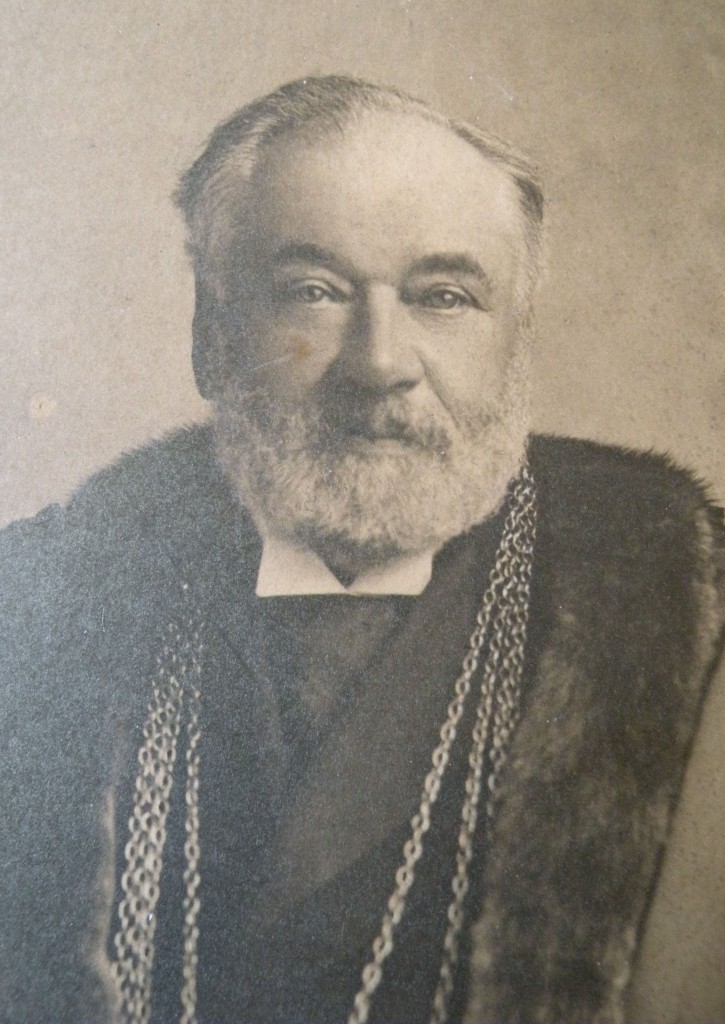William Hornsby (1838-1907)
INDUSTRIALIST William Hornsby inherited his post with the family firm, Richard Hornsby & Sons but proved to be every bit as astute as his father.
He also inherited his father’s poor health.
Born on Christmas Day 1838, he was the third son the late Richard Hornsby, who in 1815 founded the business. He was born and brought up in the house adjacent to the works, which later became part the offices.
He received his early education Grantham Grammar School, and afterwards entered Wesley College, Sheffield.
Then with the object of enhancing his father’s business, he served an apprenticeship at the works, devoting himself to the engineering branch. The knowledge acquired was much value to him in after-life.
When Richard Hormsby, sen, died in 1864he left the business to his three sous—Richard, James, and William—by whom it was considerably developed and enlarged.
A limited liability company was formed in 1879, the two surviving brothers joining the board, acting from 1880 until 1893 as joint managing directors.
In 1860 he married his cousin, Annie Etheldreda, daughter ‘ the late Mr. John Tomlinson, of North Kelsey. For a time, They resided Welby Terrace, afterwards moving to the mansion he built for himself off Avenue-road, known as Elsham House. (His father was born at Elsham).
In the 1880s he purchased the estate Burwell, where he was Lord the Manor and patron of the living of Muckton-with-Burwell. Mr. Hornsby was excellent landlord, and was beloved by all the people on the estate.
Though a Wesleyan, he often attended the services at Muckton and Burwell three times a Sunday, and was very generous when any appeals were made to him behalf of Church work and Church organisation.
He was a member of the Institute Mechanical Engineers, and manv other kindred institutions. Although closely associated with the material progress and prosperity of Grantham, it was not until a comparatively late in his life who looked towards civic matters.
He was a man of simple domestic tastes, and of a retiring disposition, and never exhibited any desire for a public career. Before the extension the borough boundaries. he bad taken a keen interest in the work of the Spittlegate Local Board, and rendered valuable personal service in administration of parochial matters. was also member of the old Burial Board, and in that capacity was elected representative Governor of the Grammar School.
He became Mayor of the borough in 1902—a position for which he seemed peculiarly fitted, account of his prominent connection with the trade of Grantham, and because of his acknowledged business abilities, and his sound, practical, common-sense treatment of any matter with which he was required to deal.
His Mayoralty was rendered memorable by several notable acts of generosity, the most striking of these was his gift of £1,000 to institution for crippled children at Chipping Norton, in connection with Dr. Stephenson’s Children’s Homes. With friends, he paid of the £1,150 debt on the new Spittlegate School buildings in Launder Tarrace, and, promised further donations, amounting in the aggregate to £500.
The YMCA, Victoria Nurses Home, Grantham Hospital, New Somerby Church and St John’s Church were among many to receive donations from Mr Hornsby.
He became a Commission of the Peace for the borough Grantham in January, 1880, and qualified as a Magistrate a year later. He sat the Spittlegate Magestrates Court and was also a Justice the Peace for the Parts of Lindsey. He was chairman of the Lincolnshire Chamber of Agriculture in 1896, and of the Grantham and District Agricultural Association.
In 1898, filled the office of High Sheriff of the county and in the same year was appointed Deputy- Lieutenant.
Mr. Hornsby inherited a strong love of the Wesleyan faith from his father, who was actively concerned in the erection of Finkin Street Chapel. For three years he held the important post of Circuit Steward, for a time he was Sunday School Secretary, and also a teacher.
Mr. Hornsby took a leading part the erection of the Wesley Chapel, Spittlegate, in1874, feeling most keenly that something ought to be done for the spiritual welfare this densely-populated district.
The Firm mode a gift the site valued at£500—and Mr. Hornsby himself subscribed similar amount in cash, afterwards increasing donations of £100.
He also subscribed largely to the repairs and building of country chapels at Ingoldsby, Carlton, Buckminster, Corby Glen, Great Ponton, Sewstern, Skillington (extensive alterations), and Eaton.
Mr Hornsby died following a paralytic seizure while attending the evening service Wesley Chapel, Spittlegate. He was very ill during the ensuing weeks.





Leave a Reply
You must be logged in to post a comment.